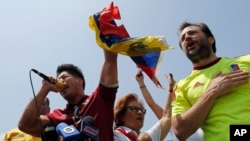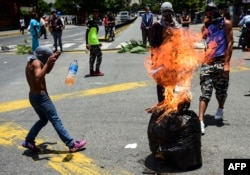A Venezuelan mayor-turned-fugitive has called for anti-government protesters to keep defying leftist President Nicolas Maduro, who has grabbed increased powers through a new legislative superbody stacked with Socialist Party loyalists.
Ramon Muchacho of the wealthy Chacao district of the capital, Caracas, appeared in a video shot from a clandestine location after the pro-government Supreme Court removed him from office and sentenced him to 15 months in prison Tuesday.
He was the fourth Venezuelan mayor to be charged over the last 15 days with failing to prevent street protests from blocking traffic through their jurisdictions. A fifth opposition mayor, David Smolansky of the El Hatillo district of Caracas, was scheduled for a court hearing later Wednesday.
"To all Venezuelans, the message is to continue in this struggle," said a bearded Muchacho, clad in a white T-shirt emblazoned with the Venezuelan flag and appearing before a plain white backdrop. The video was circulated on social media.
Cachao has been the epicenter of demonstrations against Maduro, and the video, which Muchacho said was shot around midnight, could help breathe new life into a protest movement that recently appeared to be flagging.
More than 125 people have died in unrest since the opposition began a sustained wave of protests in April, demanding an early presidential election that it says Maduro would surely lose.
The president's popularity has been pounded by an economic crisis marked by shortages of food and medicine and triple-digit inflation.
The opposition, which gained control of Venezuela's congress in 2015, only to see its decisions nullified by the Supreme Court, boycotted the July 30 election of the legislative superbody, known as the constituent assembly.
Critics say the new 545-member body is an attempt to remove any remaining checks on Maduro's power. It has authority to rewrite the constitution and allow Maduro to rule by decree.
In its first session on Saturday, the assembly fired chief prosecutor Luisa Ortega, who had accused Maduro of human rights abuses and condemned the election of the political body as an affront to democracy. Her arrest confirmed opposition fears that the assembly would be used to get rid of anti-Maduro officials.
New U.S. sanctions
The Trump administration imposed sanctions on eight more Venezuelan officials on Wednesday, including the brother of previous President Hugo Chavez, to punish them for their roles creating the new assembly, U.S. officials said.
Washington slapped sanctions on Maduro himself last week following similar action against 13 Venezuelan officials in July. The measures freeze the targets' U.S. assets, ban them from travel to the United States and prohibit Americans from doing business with them.
Maduro regularly laughs off Washington's disapproval of his government and blames the U.S. "empire" for Venezuela's economic woes. He has said the new assembly is needed to bring peace and prosperity to Venezuela.
The assembly has declared that its decisions will not be subject to interference from Venezuela's opposition-controlled congress, which met Wednesday to discuss regional moves to oppose Maduro's government.
Peru joined the United States and other countries in calling Maduro's government a "dictatorship" Tuesday, after hosting the first meeting of a 17-member regional bloc that says it wants to bring a peaceful end to Venezuela's deepening political and economic crisis.
In a joint declaration released after a meeting in Lima, countries including Canada, Brazil, Argentina, Mexico, Chile and Colombia condemned the "breakdown of democratic order" in Venezuela and said they would not recognize any action taken by its "illegitimate" new constituent assembly.






